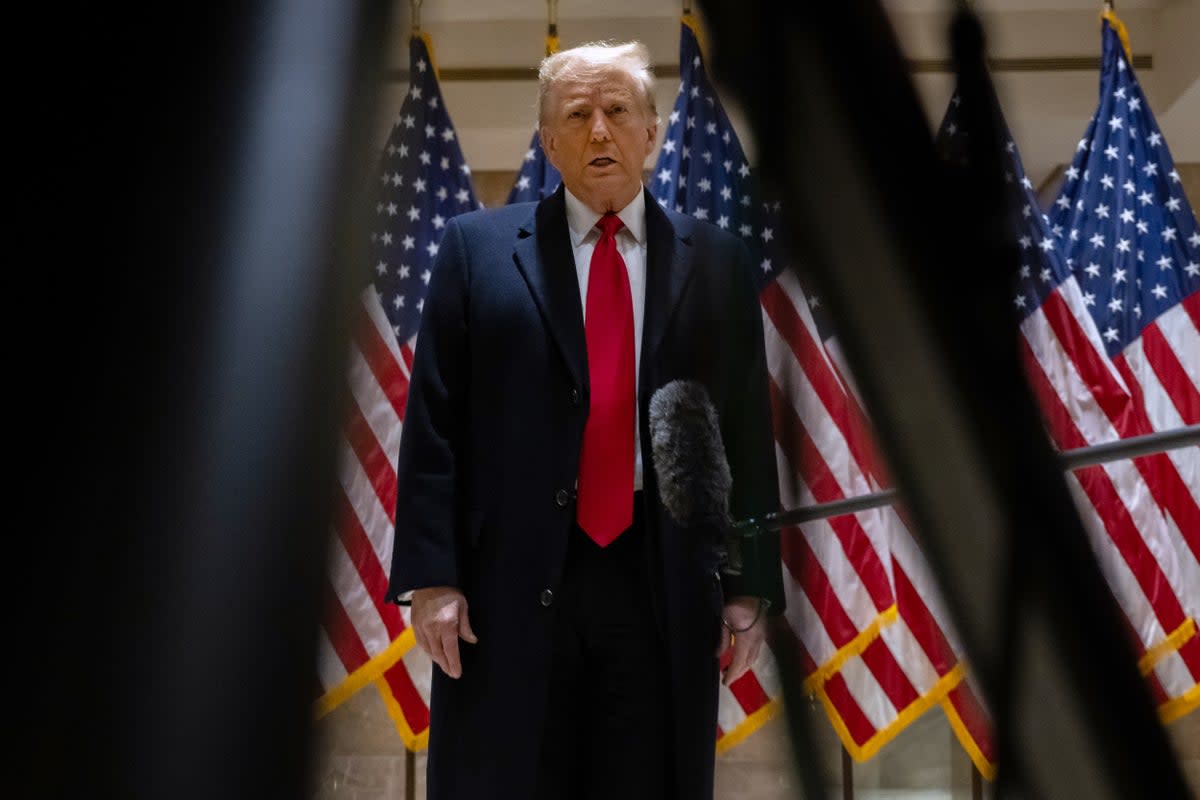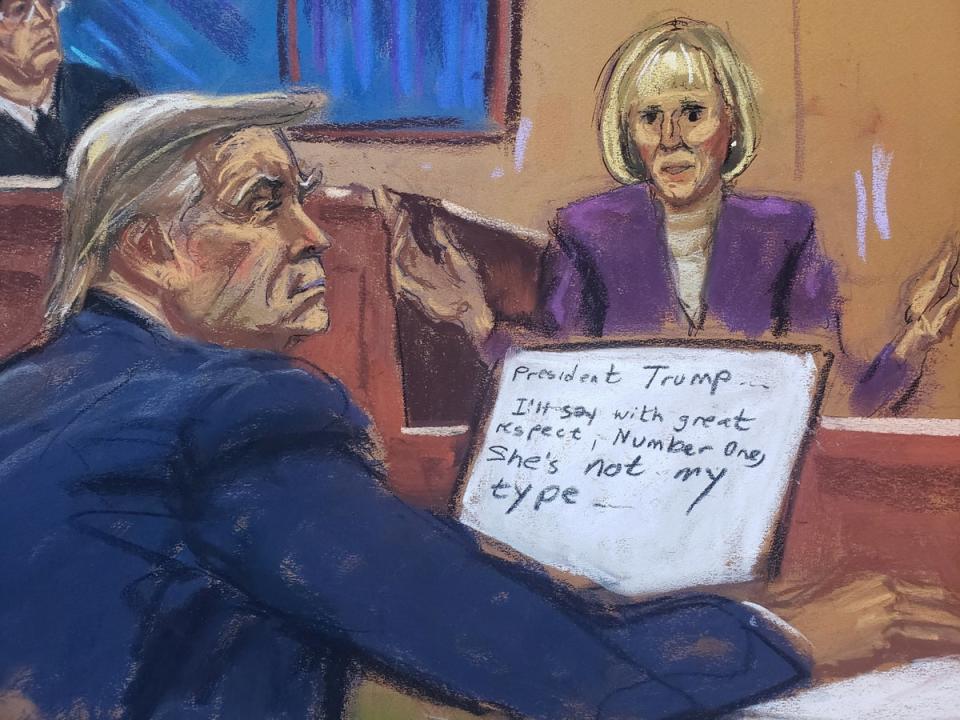Trump squeezes his trials for political gain before the possibility of millions of dollars in fines

He hunched his shoulders in front of a microphone to berate the judge in front of him. The judge started a timer on his phone, and Donald Trump exhaled a minutes-long, unbroken sentence of worn-out grievances.
These calculated in-court outbursts are now a routine part of what will be many more months of courtroom appearances for the former president, whose campaign for the presidency relies on his legal challenges to cast himself as a victim of a political deep state that he’s running against.
To Mr Trump, the justice system is illegitimate when his livelihood is at stake. The judges, prosecutors, court staff and people suing him are Democratic stooges working together across jurisdictions to wage lawfare against him, and he’s either innocent of allegations against him or deserves immunity from prosecution, he says.
Mr Trump and his attorneys have repeatedly defied courtroom instructions and gag orders because they see routine boundaries as politically motivated and illegal. The courtrooms become extensions of his campaign rally stages. When evidence is presented against him, Mr Trump and his lawyers offer distractions with dubious court filings, in-court arguments and out-of-court tantrums to reclaim headlines.
Alina Habba, an attorney for a Trump-affiliated political action committee, was flailing in federal court this week while defending the former president against a multi-million dollar defamation claim. But the defence from Ms Habba and other attorneys for Mr Trump isn’t meant for the courtroom, nor is their performance for the judge and jury. It’s for an audience that’s not there, and their value is political, not legal.

“Given the weakness of his legal position, it looks like Trump is aiming his arguments not at the court but at a different audience: the public. But that won’t be successful, in either the civil case or the criminal prosecutions,” write legal experts Norm Eisen, Joshua Kolb and Andrew Warren.
Faced with the possibility of having to pay Rudy Giuliani-level damages from E Jean Carroll’s lawsuit against him, in the same month a New York judge is expected to issue a judgment that could see tens of millions more on top of it, the aggrieved frontrunner for the 2024 Republican nomination for president is running a campaign fuelled by the politics of resentment. Support from a base that hates what’s happening to him as much as he does is more valuable to him than avoiding potentially crushing verdicts.
If he’s reprimanded for blurting out disparaging statements from inside the courtroom, he can claim “election interference.” If the mountain of evidence or testimony against him is too damning, he can hold a press conference in a nearby hallway or in front of nearby cameras to proclaim his innocence and smear the cases against him.
And just as Mr Trump relies on messianic memes declaring he was sent by God, the more publicity around his criminal and civil cases, and the more evidence and arguments reveal the scope of his alleged corruption, the more he feels entitled to evade liability.
He argues his “immunity” from prosecution for crimes committed as president while he appeals to his supporters as the one person who can save them from an all-encompassing evil. He’s a “shepherd to mankind,” according to one video shared by the campaign, who is being “indicted for you,” he repeatedly tells his followers.
A victory at the Iowa caucuses has only emboldened him; 64 per cent of caucus voters believe he would still be fit for the presidency if he’s convicted. One day after his win in Iowa, he sparred with a federal judge who threatened to remove him from a trial he was in no way obligated to attend. Then he held a press conference at his 40 Wall Street property where he claimed that he was the one – not the woman who accused him of sexual assault – who should be paid damages.
The stunts have been lucrative for his campaign, racking in millions of dollars from fundraising messages that mention his criminal indictments and lawsuits, twisting felony charges and threats to his eligibility to run for office into a message that “they” are “coming after you” too.

Ms Habba, who emerged from Mr Trump’s golf club membership circle and is now among attorneys earning millions of dollars from political action committees tied to his campaign, is also one of the last few attorneys in an evaporating pool of legal minds defending him. High-profile criminal defence attorney Joe Tacopina and his associates withdrew from Mr Trump’s legal team one day before opening arguments in the defamation trial.
Ms Habba’s firm Habba Madaio & Associates LLP has received more than $3.5m from Trump-affiliated PACs since 2022, according to federal campaign finance records. The firm received more than $2m in 2022. Last year, the firm was paid more than $1.5m.
Robert & Robert PLLC, the firm for Trump attorney Clifford Robert, who has represented Donald Trump Jr and Eric Trump in the Trump Organization’s civil fraud trial, was paid more than $1.3m by the Save America PAC last year.
Mr Trump’s appeals and straining of the law signal to supporters an administration that will operate outside of it. His all-caps message on Truth Social after appearing in federal court this week demanded “full immunity” for the office of the presidency to “properly function”, serving as both a threat and a promise for his potential second term.
That “immunity” defence, to be decided by a federal appeals court and likely the US Supreme Court, is conditioning his supporters for an administration that acts on the dehumanising and delegitimising efforts of the commander-in-chief. More than half of his supporters believe that “things have gotten so far off track in this country, we need a leader who is willing to break some rules if that’s what it takes to set things right,” opening a crack in the door to authoritarianism that the candidate is telegraphing almost daily. He’s convinced his supporters that his problems are now theirs, and “retribution” is coming.


